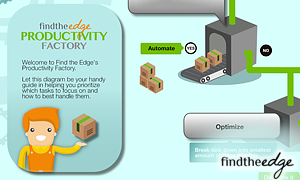 Are you happy when you're at work? If you are, then this is probably helping your business, because research by Nic Marks suggests you are likely to be up to 50% more productive.
Are you happy when you're at work? If you are, then this is probably helping your business, because research by Nic Marks suggests you are likely to be up to 50% more productive.
As an entrepreneur or business leader, you are expected to be happy because you’re the top dog and you can – apparently – do what you want, whenever you want. But are you truly happy?
If you’re not (and you are certainly not alone), it goes a lot deeper than the stresses of long hours, staff issues, and juggling your cash flow.
Whether you like it or not, you're defined by your values and morals. Many people try to separate their business and personal lives as much possible, but you can only do this to a certain extent.
You may feel like a different person at home to the one you are at work, but your values should remain consistent throughout. If you persist with pushing them to one side while working, it's only going to be a matter of time before there's some kind of collision.
At the very least, it's going to be hitting your levels of engagement, innovation and productivity. If you don't believe in what you're doing, something needs to change – and fast.
It was the Chinese philosopher, Confucius, who said: ‘Choose a job you love, and you will never have to work a day in your life.' That quote is still relevant today – however overused it may be.
What are your values?
You may be saying to yourself ‘But I’m good at what I do’ or ‘I make loads of money so there’s no need to research myself’.
It's very easy to do this, but take a moment and think hard about how well you actually – honestly – know yourself.
Try writing down your own characteristics, values and qualities. Many people are surprised when they struggle to do this. They either write empty buzzwords (I'm a driven go-getter etc.), or simply say they just ‘know' who they are.
To get the best out of yourself, you need to really know who you are and be able to define it.
Taking the time to research and get to know yourself properly can make all the difference to how you approach your work, make you more effective at what you do, and help you to resolve any issues that are holding you back professionally.
How to start researching yourself
The tragedy is that most people who admit they're unhappy and unfulfilled by their work will simply continue plodding along – thinking they're doing the right thing for their future. In reality, all they're doing is wasting it.
Scott Dinsmore covers this on his website – Live Your Legend, which has some great, inspiring advice. He says all you need to do is ask yourself why you're doing what you're currently doing.
For a lot of people, it's simply because they've been told they should be doing it by someone in the distant past, or – as Dinsmore says – they're leading a ‘scripted life'.
For other people, they're hooked on their current lifestyle, and need the money to maintain it.
Are these good enough reasons to continue doing something that your values aren’t aligned with?
If so, then that’s your choice, but if you really want to be truly happy in what you are doing, your challenge is to find something you love – that you're passionate about, and that you're desperate to throw yourself into.
If you can find this, you'll be engaged, inspired and motivated to make a difference to your own life, and those of others around you.
Hopefully you're already in this situation, but if not, it's time to do some serious soul searching. This doesn’t necessarily mean ditching your business and starting from scratch – which I’ll come onto shortly.
Looking in the mirror
Let's return to your list of values from earlier. What do you work for, and why do you do what you do?
J.D. Meier gives some tips on his blog that will help you to be completely honest when doing this. You need to look at each value you have written down, and then challenge it:
- Is it your value – have you simply been told and accepted that you should have this value?
- Does the value lead to another one – if you value being able to earn money so you can give your family a comfortable life, then you value your family's happiness, not earning money, for example.
Websites like YourMorals.org can also help by giving you questionnaires to answer. Remember, it's only worth doing these if you're going to be totally honest.
Once you have this list of true values, you can look at your current work situation. Are the values reflected in how you conduct yourself each day, and the work you do?
If not, chances are you're in the non-productive % who are unhappy.
If you do identify a clash between your values and your work, by sticking with it, you're always going to be swimming against the tide.
Making changes
If you're in this uncomfortable position, don't worry. You basically have two choices to change things for the better:
- Change what you're doing completely – this is obviously incredibly difficult and daunting for most people, and can be totally impractical if you are making your living from what you are doing and have overheads to pay.
- Think about how the product or service you currently provide can be adapted – you don't need to make wholesale changes, you can simply adapt what you're currently doing to suit your values and be a true reflection of who you really are. Are you happy with your follow-up process with your customers for example? Are you serving them or just taking from them? On the flipside, are there people taking advantage of you and is it time to finally put a stop to it?
It may be difficult, but there's no point wasting any more time doing something you don't like. It will only hold you back from achieving happiness, and you'll never be able to be the best you can be if you're dragging your feet throughout your career.
You don't have to make the changes instantly, but having an ultimate, achievable goal will help you gradually move towards increasing your productivity and performance in business.
Dinsmore says it's key to believe there's an alternative. Too many of us write off making a daunting change like this, simply because we tell ourselves there's no other option, and we'll fail if we try.
If you really want something – and the self-research you've conducted should have confirmed whether you do – you'll always be able to find an alternative.





